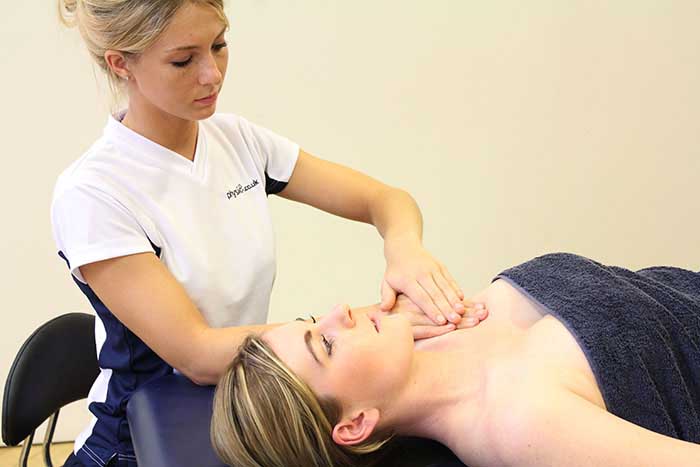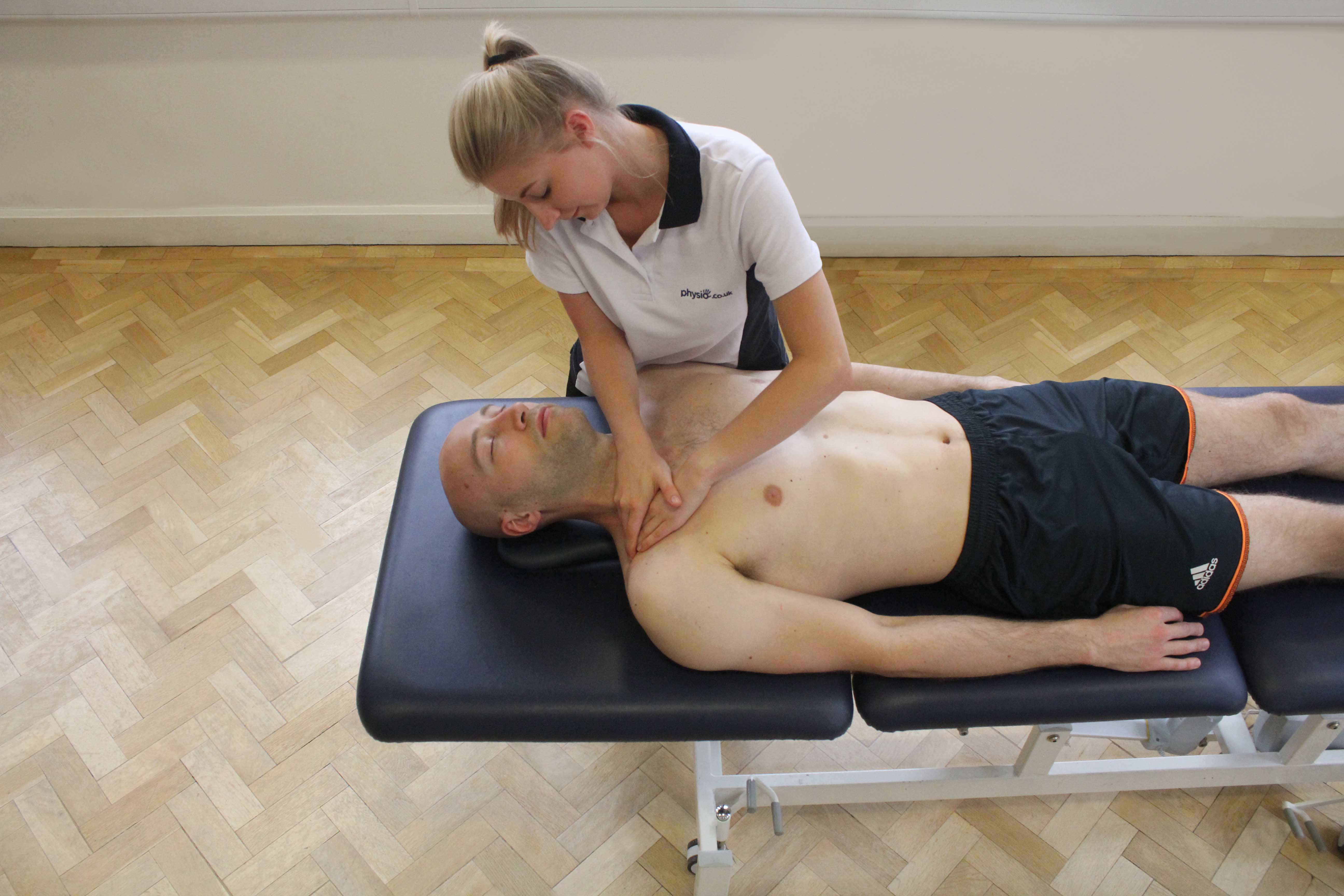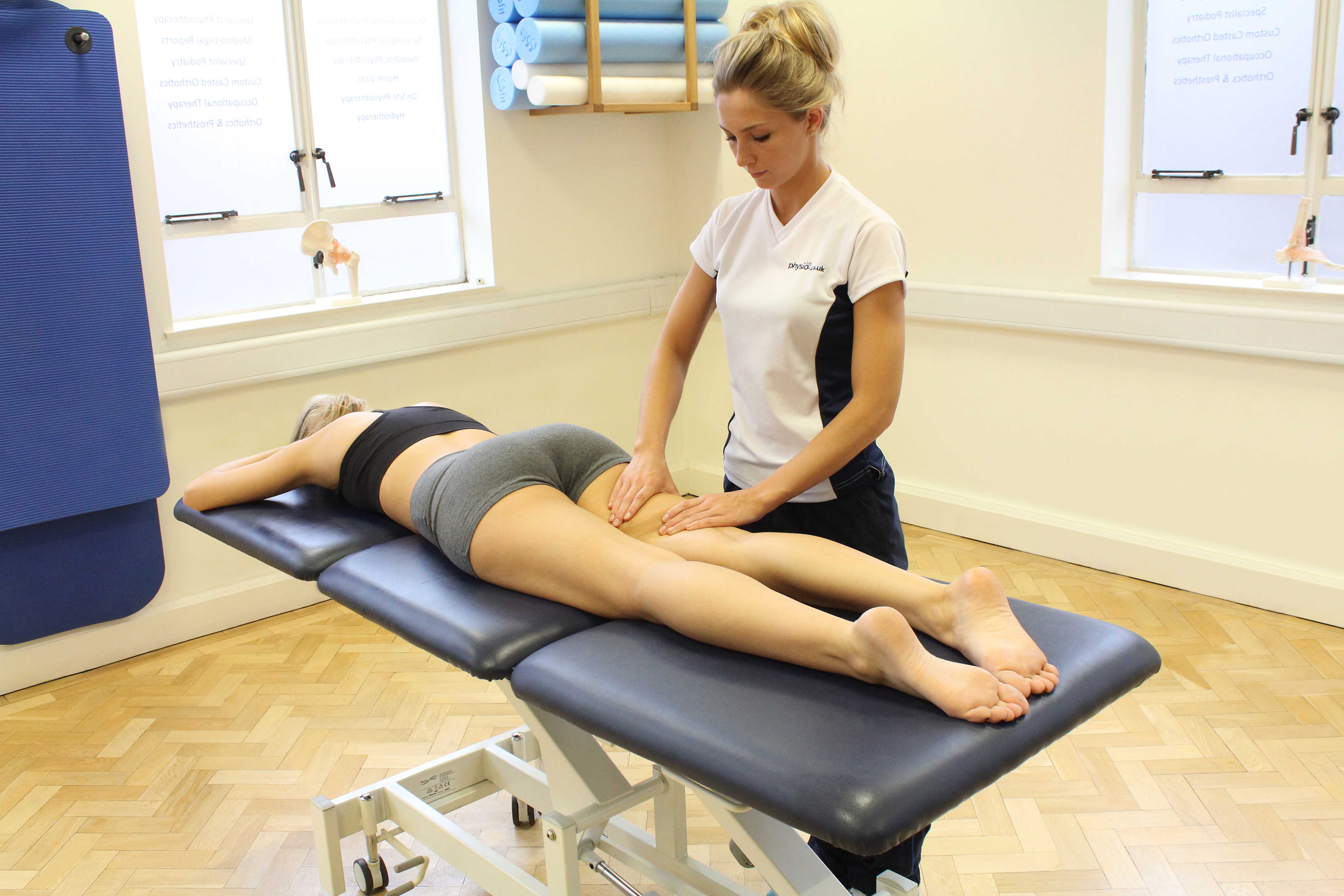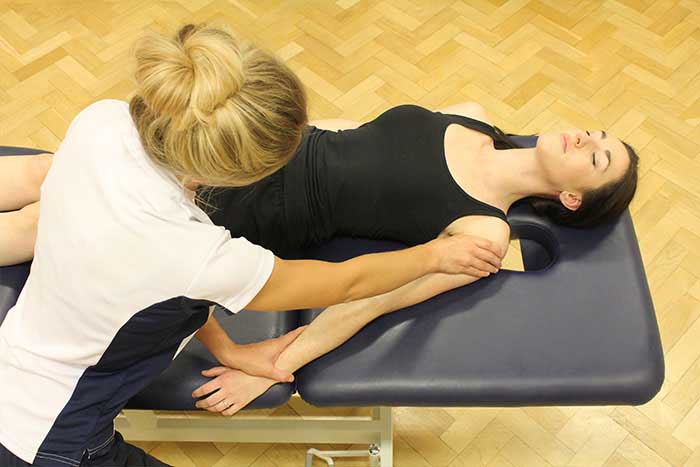Massage therapists at physio.co.uk commonly use remedial massage to manipulate and treat soft tissues alongside providing a therapeutic effect. Throughout a remedial massage a wide range of massage techniques are used to treat muscular problems. A remedial massage can be used to decrease muscular tension, reduce pain and mentally relax the body. Many benefits come from receiving a remedial massage such as relaxation, deceased tension and increased tissue elasticity.
What is a remedial massage?
Remedial massage is a massage type that is designed to treat both deep and superficial tissues. Remedial massage has a wide range of skilled techniques used to manipulate soft tissues. Remedial massage can be used specifically for relaxation or to reduce pain and normalise the body's muscles and soft tissues.

What techniques are used in a remedial massage?
At Physio.co.uk our massage therapists are experienced with a wide range of massage techniques. Common massage techniques used during a remedial massage include:
 Above: Remedial massage focused on pectoralis major and anterior deltoid
Above: Remedial massage focused on pectoralis major and anterior deltoidWithin a remedial massage treatment there is a wide range of massage techniques used. The most common remedial massage techniques are, effleurage, deep strokes, compressions, wringing, picking up and skin rolling.
Effleurage is commonly used at the start and end of a massage treatment and between various other techniques. This massage technique is performed towards the heart and lymphatic glands. The purpose of effleurage is to aid venous and lymphatic return in the body. Effleurage can also be used to stimulate cell exchange in the tissues and remove any waste products.
Deep strokes are performed along the direction of muscle fibres. Deep strokes are applied with pressure onto the muscles to increase blood circulation and muscle tone. Deep pressure applied onto the muscles can help treat muscular conditions and also produce a therapeutic effect.
Compression is used to create a deep hyperaemia in the muscles. Hyperaemia is the increased levels of blood in an area. Compression techniques are used to warm up muscles for deeper techniques and produce a softening effect.
Wringing is a specific massage technique that is performed on superficial tissues, muscles, tendons or ligament. The wringing technique compresses soft tissues, lifts, squeezes and releases to increase mobility between the tissues. Wringing helps strip muscles of tension and encourage deep relaxation.
Skin rolling is a technique performed with fingers and thumbs. Skin rolling helps clear superficial tissues of obstructions and restrictions as well as having a therapeutic effect. Skin rolling can be performed across many body parts including arms, back and legs.
 Above: Remedial massage focused on the hamstring muscles
Above: Remedial massage focused on the hamstring musclesWhat are the physiological effects of a remedial massage?
During a remedial massage there are many physiological effects. The physiological effects of a remedial massage include:
-
Break down of adhesions
The physiological effects of massage are increased venous return, the breakdown of adhesions, increased positive hormones and decreased cortisol.
Remedial massage increases venous return. Venous return is the amount of blood flow returning to the heart. Increasing venous return is beneficial to maintain healthy function of the heart. Within a remedial massage there are many different types of techniques used to encourage venous return.
A remedial massage can also help break down adhesions within soft tissues. Adhesions form due to the production of collagen fibres. Collagen fibres are built up in soft tissues due to stress, trauma and overuse. A remedial massage helps treat adhesions by using deeper massage techniques to break down collagen.
A physiological effect of remedial massage is increased endorphins, serotonin and dopamines. Remedial massage increases feel good hormones by relaxing the central nervous system and stimulating the release of hormones from the brain. Feel good hormone such as endorphins, serotonin and dopamine have a positive effect on emotions and feelings. A remedial massage encourages feelings of calm, content and happiness.
Remedial massage decreases the release of the stress hormone, cortisol. An increased level of cortisol promotes emotions of stress, anxiety and depression. By receiving a remedial massage cortisol is decreased and positive hormones are released. Massage relaxes the body and begins to release feel good hormones that replace cortisol. A remedial massage can decrease stress and maintain a healthy mental state.

What are the benefits of a remedial massage?
A remedial massage has many benefits. The benefits of a remedial massage include:
The benefits of a remedial massage are relaxation, decreased tension and increased tissue elasticity.
One benefit of receiving a remedial massage is the effect of deep relaxation. Remedial massage can be adapted to use many therapeutic massage techniques to encourage both physical and mental relaxation. Physical relaxation allow muscles to relax, lower in tone and decrease tension. Relaxed muscles decrease pain and allow better function. Remedial massage also relaxes the mind by stimulating feel good hormones from the brain. Hormones are released to enhance emotions of calmness and happiness.
A remedial massage helps decreased tension in muscles. Tension is the amount of contraction in a muscles when at relaxed state. An increase of tension can become tight, cause pain and restrict range of movement. A remedial massage decreases tension by promoting physical relaxation, increasing temperature and increasing blood circulation. An increase of temperature allows muscle fibres to loosen and separate. Loose muscle fibres allow pressure within the muscle to be released.
Remedial massage is beneficial to increase issue elasticity. Remedial massage helps increase tissue elasticity by increasing temperature of soft tissues and breaking down adhesions. Massage increases temperature by stimulating a friction against the skin. Increases temperature allows soft tissue to relax and increase in movement. A remedial massage also uses various techniques to break down adhesions and stretch and elongate fibres. Increased elasticity in soft tissue is important to allow full function and prevent injuries.
Summary
Remedial massage is used to treat muscular problems alongside encouraging deep relaxation. Many massage techniques are used during a remedial massage to achieve desired outcomes. Techniques used within a remedial massage are effleurage, deep strokes, compressions, wringing and skin rolling. Receiving a remedial massage and encourage many physiological effects on the body including increased venous return, the breakdown of adhesions, increased positive hormones and decreased cortisol. A remedial massage can be applied all areas of the body. Our massage therapists working at Physio.co.uk use remedial massage as an effective massage type to aid relaxation and treat muscular conditions.
To receive a remedial massage at Physio.co.uk please e-mail us at, office@physio.co.uk or call us on 0800 033 7800.
How can I arrange a remedial massage?
The easiest way to arrange a remedial massage with us at Physio.co.uk is to email us at, office@physio.co.uk or call us on 0800 033 7800.
Alternatively if you have any questions please feel free to contact us.
We offer a 7 day service and provide home and clinic appointments.

 0330 088 7800
0330 088 7800


































